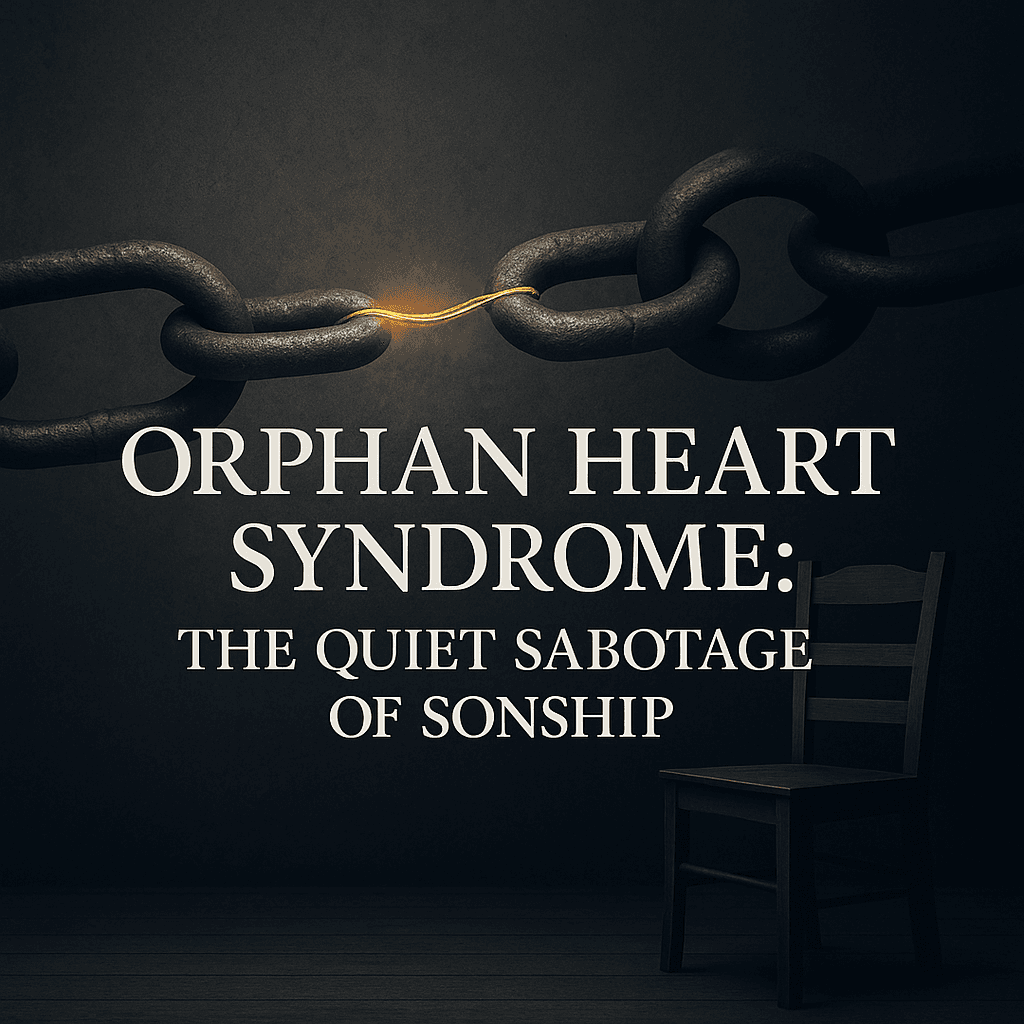
Orphan Heart Syndrome: The Quiet Sabotage of Sonship
June 17, 2025
There’s a fracture in the foundation of many hearts that often goes undetected especially in the Church. It hides beneath giftedness, behind leadership titles, even under the language of faith. But it slowly poisons covenant, chokes out belonging, and sabotages the inheritance of sons and daughters.
I call it Orphan Heart Syndrome. And make no mistake: it’s not just a feeling but a posture. A deeply ingrained way of surviving that resists being fathered, aligning healthily or truly remaining connected.
1. They Struggle to Bond in the “Bond of Peace”
Ephesians 4:3 exhorts us to “maintain the unity of the Spirit in the bond of peace.” That bond isn’t passive, rather it’s forged in trust, humility, and submission to the Spirit’s work in community.
But orphans struggle to bond. They attach temporarily, then retreat when things get too vulnerable. Peace feels suspicious. Stability feels dangerous. Covenant feels like control.
They want the benefits of community without the cost of connection. So they orbit around ministries, around leaders, even around truth but never fully commit to the house, the family, or the process.
They leave before they’re seen, or worse than that, before they’re healed. Because staying means letting someone into the parts of them that have always been guarded by grief or disappointment.
2. They Despise Their Own Inheritance
Just like Esau sold his birthright for a bowl of stew (Gen. 25:29–34), the orphan heart trades legacy for momentary relief.
Not because they don’t want inheritance, but because they don’t believe they deserve it. Deep down, they’re convinced that belonging is a mirage, that favor is fleeting, and that if they get too close, it will all be taken away.
So they preemptively reject what heaven has made available, despising the very thing they were born for.
Inheritance can’t be fully received without identity. And identity can’t be secured without belonging. The orphan heart short-circuits the whole system by refusing to be rooted. It keeps reaching for a crown without ever sitting at the table.
3. They Choose “Independent From” Instead of “Interdependent With”
The orphan heart doesn’t just long for freedom, it mistrusts structure. It fears accountability. And it rejects any form of dependence as weakness or control.
But in the Kingdom, maturity isn’t independence rather it’s healthy interdependence. It’s being joined, not in codependence or control, but in covenant.
Jesus never modeled isolation. He chose to walk in oneness with the Father, with His disciples, and with the Spirit. Yet the orphan heart rebrands isolation as “calling,” detachment as “discernment,” and rebellion as “revelation.”
They’re always just outside the gate being very "present", but unplanted. Active, but unaccountable. Gifted, but unwilling to be joined.
4. They Gravitate Toward Fantasy Over Reality
When relationship has been a source of pain, fantasy becomes a form of comfort.
Orphan hearts build castles in the sky and ministries no one can touch, callings no one can question, futures no one can hold accountable. They speak in dreams but avoid the discipline required to build.
Reality demands engagement, process, and pruning. Fantasy allows for control and avoidance.
But in the Kingdom, reality is where transformation happens. It's where you wrestle, get sharpened, grow roots, and bear fruit. Fantasy delays growth. It keeps people wandering often chasing affirmation instead of stewarding assignment.
The Father Is Still Setting Orphans in Families
Psalm 68:6 tells us, “God sets the lonely in families.” That includes the spiritually orphaned.
This is the season where the Spirit of Adoption is confronting every internal structure built on fear, detachment, or performance. The Father isn’t recruiting performers—He’s calling home sons and daughters.
If you’ve seen yourself in any of this, don’t shrink back in shame—lean in. This isn’t a rebuke, it’s an invitation.
And if you’ve been circling the edges of spiritual community, it’s time to get planted. If you’ve been despising the very inheritance the Lord has laid before you, it’s time to reclaim it. If you’ve traded reality for fantasy, it’s time to return to the table—where you can be fully known and fully loved.
Support This Ministry
If this content has blessed you, consider partnering with us to reach more lives with the Gospel.
Partner with Us